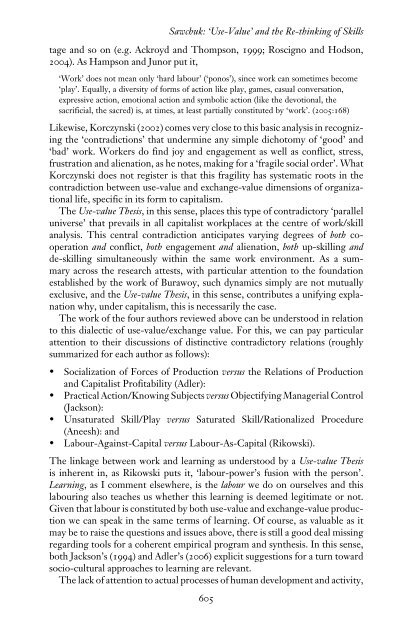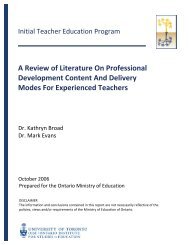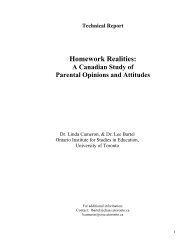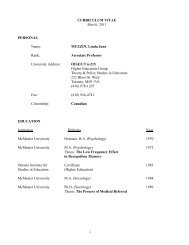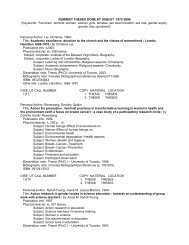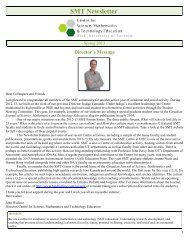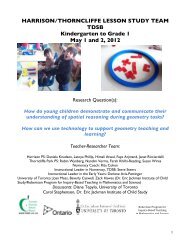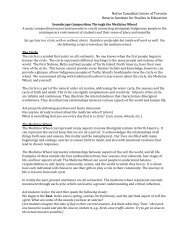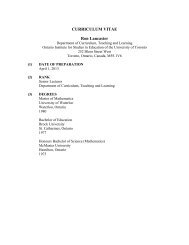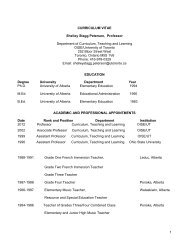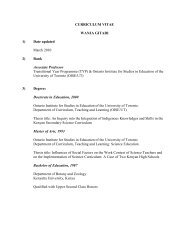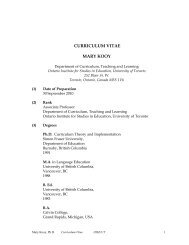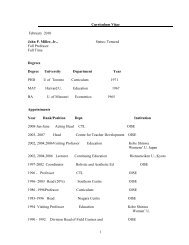'Use-Value' and the Re-thinking of Skills, Learning and the Labour ...
'Use-Value' and the Re-thinking of Skills, Learning and the Labour ...
'Use-Value' and the Re-thinking of Skills, Learning and the Labour ...
Create successful ePaper yourself
Turn your PDF publications into a flip-book with our unique Google optimized e-Paper software.
Sawchuk: ‘Use-Value’ <strong>and</strong> <strong>the</strong> <strong>Re</strong>-<strong>thinking</strong> <strong>of</strong> <strong>Skills</strong>tage <strong>and</strong> so on (e.g. Ackroyd <strong>and</strong> Thompson, 1999; Roscigno <strong>and</strong> Hodson,2004). As Hampson <strong>and</strong> Junor put it,‘Work’ does not mean only ‘hard labour’ (‘ponos’), since work can sometimes become‘play’. Equally, a diversity <strong>of</strong> forms <strong>of</strong> action like play, games, casual conversation,expressive action, emotional action <strong>and</strong> symbolic action (like <strong>the</strong> devotional, <strong>the</strong>sacrificial, <strong>the</strong> sacred) is, at times, at least partially constituted by ‘work’. (2005:168)Likewise, Korczynski (2002) comes very close to this basic analysis in recognizing<strong>the</strong> ‘contradictions’ that undermine any simple dichotomy <strong>of</strong> ‘good’ <strong>and</strong>‘bad’ work. Workers do find joy <strong>and</strong> engagement as well as conflict, stress,frustration <strong>and</strong> alienation, as he notes, making for a ‘fragile social order’. WhatKorczynski does not register is that this fragility has systematic roots in <strong>the</strong>contradiction between use-value <strong>and</strong> exchange-value dimensions <strong>of</strong> organizationallife, specific in its form to capitalism.The Use-value Thesis, in this sense, places this type <strong>of</strong> contradictory ‘paralleluniverse’ that prevails in all capitalist workplaces at <strong>the</strong> centre <strong>of</strong> work/skillanalysis. This central contradiction anticipates varying degrees <strong>of</strong> both cooperation<strong>and</strong> conflict, both engagement <strong>and</strong> alienation, both up-skilling <strong>and</strong>de-skilling simultaneously within <strong>the</strong> same work environment. As a summaryacross <strong>the</strong> research attests, with particular attention to <strong>the</strong> foundationestablished by <strong>the</strong> work <strong>of</strong> Burawoy, such dynamics simply are not mutuallyexclusive, <strong>and</strong> <strong>the</strong> Use-value Thesis, in this sense, contributes a unifying explanationwhy, under capitalism, this is necessarily <strong>the</strong> case.The work <strong>of</strong> <strong>the</strong> four authors reviewed above can be understood in relationto this dialectic <strong>of</strong> use-value/exchange value. For this, we can pay particularattention to <strong>the</strong>ir discussions <strong>of</strong> distinctive contradictory relations (roughlysummarized for each author as follows):• Socialization <strong>of</strong> Forces <strong>of</strong> Production versus <strong>the</strong> <strong>Re</strong>lations <strong>of</strong> Production<strong>and</strong> Capitalist Pr<strong>of</strong>itability (Adler):• Practical Action/Knowing Subjects versus Objectifying Managerial Control(Jackson):• Unsaturated Skill/Play versus Saturated Skill/Rationalized Procedure(Aneesh): <strong>and</strong>• <strong>Labour</strong>-Against-Capital versus <strong>Labour</strong>-As-Capital (Rikowski).The linkage between work <strong>and</strong> learning as understood by a Use-value Thesisis inherent in, as Rikowski puts it, ‘labour-power’s fusion with <strong>the</strong> person’.<strong>Learning</strong>, as I comment elsewhere, is <strong>the</strong> labour we do on ourselves <strong>and</strong> thislabouring also teaches us whe<strong>the</strong>r this learning is deemed legitimate or not.Given that labour is constituted by both use-value <strong>and</strong> exchange-value productionwe can speak in <strong>the</strong> same terms <strong>of</strong> learning. Of course, as valuable as itmay be to raise <strong>the</strong> questions <strong>and</strong> issues above, <strong>the</strong>re is still a good deal missingregarding tools for a coherent empirical program <strong>and</strong> syn<strong>the</strong>sis. In this sense,both Jackson’s (1994) <strong>and</strong> Adler’s (2006) explicit suggestions for a turn towardsocio-cultural approaches to learning are relevant.The lack <strong>of</strong> attention to actual processes <strong>of</strong> human development <strong>and</strong> activity,605


